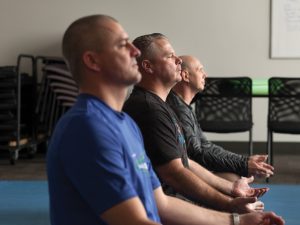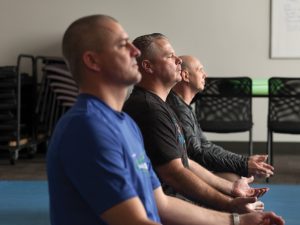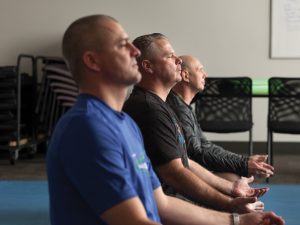Reduce Aggression in Law Enforcement Officers with Mindfulness
By John M. de Castro, Ph.D.
“Law enforcement officers (LEOs) are exposed to significant stressors, elevating their risk for aggression and excessive use of force, as well as mental health consequences, including post-traumatic stress disorder, burnout, alcohol misuse, depression, and suicide. Mindfulness training is a promising approach with high-stress populations that has been shown effective for increasing resilience and improving negative mental health outcomes common among LEOs.” – Michael Christopher
Policing is a very stressful occupation. Stress in police can result from role conflicts between serving the public, enforcing the law, and upholding ethical standards and personal responsibilities as spouse, parent, and friend. Stress also results from, threats to health and safety, boredom, responsibility for protecting the lives of others, continual exposure to people in pain or distress, the need to control emotions even when provoked, the presence of a gun, even during off-duty hours, and the fragmented nature of police work, with only rare opportunities to follow cases to conclusion or even to obtain feedback or follow-up information.
This stress can have serious consequences for the individual and in turn for society. Police officers have one of the highest suicide rates in the nation, possibly the highest. They have a high divorce rate, about second in the nation. They are problem drinkers about twice as often as the general population. This is a major problem as stress and the resultant complications can impact job performance, which sometimes involve life or death situations. It can also lead to increased aggressiveness. Mindfulness training has been shown to improve the physiological and psychological responses to stress. So, it is likely that mindfulness training with police can help them cope with the stress, improve their psychological well-being, and reduce aggressiveness.
In today’s Research News article “Differential impact of mindfulness practices on aggression among law enforcement officers.” (See summary below or view the full text of the study at: https://www.ncbi.nlm.nih.gov/pmc/articles/PMC8274577/ ) Ribeiro and colleagues recruited meditation naïve law enforcement officers and randomly assigned them to a wait-list control condition or to receive 8 weekly 2-hour sessions of Mindfulness-Based Resilience Training (MBRT) including body scan, sitting and walking meditations, mindful movement, and group discussion along with home practice. They were measured before and after practice for meditation practice and aggression, including physical aggression, verbal aggression, anger, and hostility.
They found that adherence to home practice was sporadic, with participants practicing at home on average for 14 days of the 56 days available. Nevertheless, they found that in comparison to baseline and the wait-list control condition, Mindfulness-Based Resilience Training (MBRT) produced a significant decrease in the levels of aggression. They also found that the higher the frequency of home meditation practices, the greater the total duration of home practice, and the greater the number of days practiced at home the lower the levels of aggression. This was true for all of the meditation practices.
These are interesting results that suggest that mindfulness practices reduce aggression in law enforcement officers even when practice is sporadic. Even though home practice was low, the amounts of that practice predicted the levels of reduction in aggression, the more home practice, the lower the aggression. But there were no follow-up measurements to ascertain if the effects are lasting and there was no collection of on-the-job aggression to ascertain if this reduction of aggression obtained with paper and pencil measures translates to the real world of policing. Hence, the results must be interpreted cautiously. More intensive research in the future is called for as reducing aggression in law enforcement officers would probably make them more effective and reduce burnout.
So, reduce aggression in law enforcement officers with mindfulness.
“an 8-week mindfulness intervention for police officers led to self-reported improvements in distress, mental health, and sleep, and a lower [cortisol awakening response].” – Daniel W. Grupe
CMCS – Center for Mindfulness and Contemplative Studies
This and other Contemplative Studies posts are available on Twitter @MindfulResearch
Study Summary
Ribeiro, L., Colgan, D. D., Hoke, C. K., Hunsinger, M., Bowen, S., Oken, B. S., & Christopher, M. S. (2020). Differential impact of mindfulness practices on aggression among law enforcement officers. Mindfulness, 11(3), 734–745. https://doi.org/10.1007/s12671-019-01289-2
Abstract
Objectives:
Home-based mindfulness practice is a common component of formal mindfulness training (MT) protocols. Obtaining objective data from home-based mindfulness practice is challenging. Interpreting associations between home-based mindfulness practice and clinically impactful outcomes is complicated given the variability in recommendations in length, frequency, and type of practice. In this exploratory study, adherence to home-based practices of Mindfulness-Based Resilience Training (MBRT) was studied in order to evaluate associations with clinical outcomes.
Methods:
Home practices from 24 (92% male, non-Hispanic white, aged M = 43.20 years) law enforcement officers (LEOs) from the urban Pacific Northwest enrolled in a feasibility and efficacy trial of MBRT were studied using an objective tracking device and self-report data. Outcomes included adherence to home-based mindfulness practices and self-reported aggression.
Results:
Participants completed 59.12% of the frequency amount of practice assigned in the MBRT curriculum. Frequency of practice was associated with decreased aggression, adjusted R2 = .41, F(3,23) = 6.14, p = .004. Duration of practice also predicted decreased aggression, adjusted R2 = .33, F(3,23) = 4.76, p = .011.
Conclusions:
Home-based MBRT practices for LEOs, even at low rates of adherence, may reduce aggression. MTs may show beneficial effects for other populations presented with challenges to engage in regular MT practices.




